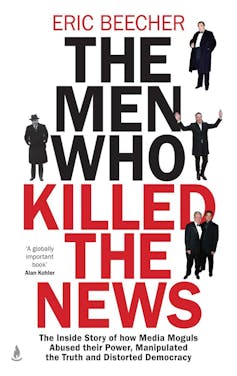Eric Beecher is a rare beast: a combination of journalist, media owner and idealist. In 1984, aged 33, he became the youngest-ever editor of the Sydney Morning Herald and he has worked around the world as a journalist. He is currently chair and the largest shareholder in Private Media, owner of several Australian news websites, including Crikey.
With The Men Who Killed the News, he has produced a book that is at once a cry of indignation at the media’s abuse of power and an attempt to chart a future for journalism.
The cry of indignation comes first. In a pacey compression of press history going back to the late 19th century, Beecher vividly illustrates how newspaper moguls from William Randolph Hearst in the 1880s to Rupert Murdoch today have cynically debased the profession of journalism in pursuit of wealth and power.
He draws on a wide range of histories, creating a kind of one-stop shop for the reader who wishes to understand how public trust in the media has eroded to the point where Donald Trump is able to make the “fake news” label stick.
Review: The Men Who Killed the News – Eric Beecher (Scribner)
The men who killed the news belong to two technological ages.
The first belong to the age of industrialisation, which enabled the rapid daily production of tens of thousands of newspapers and the creation of a vast monopoly on public access to news and information. These men include not just Hearst and Murdoch, but Joseph Pulitzer, Henry Luce and A.O. Sulzberger in the United States, and Lords Beaverbrook, Rothermere and Northcliffe in Britain.
The second belong to the age of the digital revolution, which has created two behemoths whose power is greater by several orders of magnitude than all the legacy moguls combined: Mark Zuckerberg and Elon Musk.
The factors common to all, Beecher convincingly argues, are abuse of power, manipulation of the truth and distortion of democracy.

The power of the legacy moguls, though eclipsed, remains formidable. Of these, it is Murdoch who attracts most of Beecher’s attention. He joins the ranks of former Murdoch editors who have revealed the moral bankruptcy of News Corporation from the inside.
He recounts his experience when, as editor of the Melbourne Herald, he and his deputy, Bruce Guthrie, attended a News Corp executive jamboree in Aspen, Colorado. The proceedings had been enlivened by a presentation from the news editor of Murdoch’s London Sun on the beat-ups, falsehoods and character assassinations on which that newspaper’s circulation had been built. The presentation was entitled “WIT (Whatever It Takes)”.
At the conclusion of this tour d’horizon, Guthrie raised his hand: “Do you have any ethical framework at all at the London Sun?” When the shouts of derision had died down and Guthrie had repeated his question twice, the news editor confessed that they didn’t really have an ethical framework at all.
Beecher writes that Murdoch had been shocked to discover a “wanker” in their midst.
The accountability dilemma
In a chapter called “The Moral Compass”, Beecher contrasts the culture of News Corp with that of other newspaper organisations: the New York Times, the Guardian, the Washington Post, Le Monde and, in Australia, the Sydney Morning Herald, where he had been editor from 1984 to 1987, before being lured to Murdoch’s Herald and Weekly Times. He is right to pay some attention to organisations like these, because they have been faithful to the functions of the media that are essential to a functioning democracy.
At the same time, Beecher points out the unresolved dilemma in the democratic arrangements of many Western countries: how to hold the media to account while not violating the principle of free speech. He identifies the resultant paradox. In the absence of an effective accountability mechanism, media moguls, as custodians of journalism, are entrusted to protect it, yet incentivised to exploit it.
Beecher does not go on to explore the means by which this might be resolved. That is a pity, because both the Leveson Inquiry into phone hacking by Murdoch’s London Sun and News of the World, and the Australian Competition and Consumer Commission have suggested an approach that might be summarised as statute-based self-regulation.
Contemporaneously with Leveson, the Finkelstein Inquiry into media regulation in Australia recommended a statutory authority. In Scandinavia, there has been statute-based regulation at least since the end of the second world war. A discussion about these possible remedies would have significantly strengthened this part of the book.
Impact of the internet
The erosion of public trust through centuries of ethical failure is the first of two great themes that run through the book. The other is commercial failure caused by the effect of the internet and social media on the revenue and informational monopoly long enjoyed by newspapers, radio and television. Here the men who killed the news exhibit desperation, complacency and hubris on a historically grand scale.
The desperation is seen in the way great newspaper dynasties, such as the Graham family at the Washington Post, have had to sell out to digital billionaires, in their case to Amazon founder Jeff Bezos, to financially rescue their papers. It is a pattern repeated across the US and Europe.
The complacency and hubris are illustrated by the account Beecher gives of being commissioned by a director of Fairfax, when it still owned the Sydney Morning Herald, the Age and the Australian Financial Review, to write a report on the future of the business.
This was in the middle of the first decade of the present century, when the evidence was beginning to show the internet having a measurable impact on advertising revenues. At the time, the Sydney Morning Herald and the Age were still carrying about 200 broadsheet pages of classified advertising a week, generating combined annual profits of about $200 million. But the company had no internet strategy and no media experience on the board.

In his report, Beecher raised the prospect of a “catastrophe scenario” as classified advertising migrated online, virtually wiping out the company’s profits. He recommended the urgent creation of a digital operation to compete alongside the parent company.
At this, “a visibly agitated director” strode to the head of the boardroom table, picked up a vast lump of newsprint that was a Saturday paper, dropped it on the table with a loud thud, and said he never wanted anyone coming into the boardroom again saying that people would look for a house or car or job “without this!”
It is no surprise that, in 2018, what was left of the Fairfax empire ended up in the hands of Nine Entertainment, an organisation with an editorial culture about as far removed from that of the Fairfax newspapers as can be imagined.
Looking to the future, Beecher confronts the central question facing the institution of the media: can journalism fulfil its democratic function without being propped up by financial subsidies?
The answer, of course, is no. Journalism has always been subsidised, either by advertising, as in commercial media, or by taxpayers in the case of public sector broadcasting.
Prospects for survival
In the absence of strong advertising revenue, how might commercial media survive? Beecher points to a few success stories.
One is the New York Times, which has built a subscriber base of 10 million, greater than that of 11 other major newspapers across the US and western Europe combined. Others are the Wall Street Journal, the Financial Times and the Economist. The common factor is that these publications produce original journalism regarded by their audiences as indispensable.
The lesson is that, in order to succeed, newspapers will need to accept that the idea of “mass” media is an anachronism. Instead, they will need to focus intensely on the needs of a relatively narrow audience base. The watchword is indispensability: what news does our audience feel it cannot do without?
Beecher lists a catalogue of types of journalism – collaborative, solutions-focused, constructive, and several more – that might make a contribution. These types all point to the need for a dramatic cultural shift in news values and journalistic outlook. Negativity and conflict, for so long the news values most attractive to news desks, are now driving people to avoid news or seek distraction on social media.
Beecher touches on the idea of government assistance, recognising that it involves collaboration between adversaries: politicians and the journalists whose job is to hold them to account. It works with public sector broadcasting, but only because the relationship is governed by elaborate legislation designed to protect editorial independence and because of long-established conventions.
He points out the benefit of Australia’s News Media Bargaining Code, which forced Google and Facebook to pay Australian media companies for their content. But even as his book comes out, we see Facebook refusing to renew its deal under the code and Google adding a clause that allows it to cancel its deal after each year.
In the end, Beecher returns, rightly, to the urgent need to rebuild public trust. There is no magic bullet. News publishers, he says, need to demonstrate their commitment to ethical journalism and professional conduct in a manner that is non-partisan, non-ideological, non-arrogant and believable.
His idealism is to be taken seriously. Journalism must play its proportional role in reinvigorating public confidence in the institutions of democracy if societies, like Australia’s, wish to retain the liberal values on which democracy is built.
The Men Who Killed the News is a book for the times.
Denis Muller was a colleague of Eric Beecher's at The Sydney Morning Herald in the 1980s.
This article was originally published on The Conversation. Read the original article.







